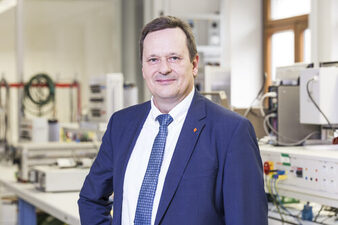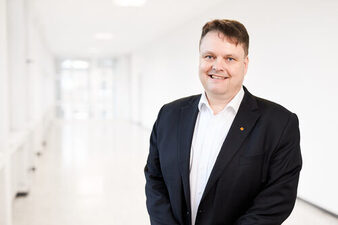What is it about?
The Master's degree program in Electrical Engineering and Energy Systems is unique in North Rhine-Westphalia, as it has a strong systems engineering focus, a very broad content and a particularly high practical component. You will deepen your knowledge from the Bachelor's degree programs in Electrical Engineering and Energy Management and Energy Data Management, specialize on a scientific basis and develop your creative and creative engineering skills.
Profile of the study program
Electrical Engineering and Energy Systems deals with questions such as
- How are modern, intelligent drive systems realized?
- How are hardware and software components developed in automation technology?
- How are energy technology and the energy industry viewed legally and scientifically?
- How do research and development projects in engineering work?
Full-time or part-time scientific and practical work
The standard period of study is four semesters; part-time courses last six semesters. The part-time course offers a particularly high proportion of practical work and therefore meets the requirements of industrial companies.
In the first and second semesters, you will learn scientific methods through the subjects Higher Mathematics and Theoretical Electrical Engineering. The Master's study program offers specializations in the fields of drive system technology, electronics and sensor technology, energy systems technology and energy management. You choose the compulsory module of the desired specialization and a further compulsory module from the remaining three specializations, so that two specializations are initially open to you. The final choice of specialization is then made via the Master's thesis and the topic of the Master's thesis. The study programme is rounded off by freely selectable compulsory elective modules, in which you can either specialize further in your subject or take a look at related areas.
Ruhr Master School
The range of electives is complemented by the integration of the study program into the Ruhr Master School (RMS). The RMS bundles and networks the expertise of the Fachhochschule Dortmund, Bochum University of Applied Sciences and Arts and the Westfälische Hochschule in Gelsenkirchen in the fields of engineering and computer science. International project-oriented components, summer schools and specialist conferences complement these offerings.
Master of Engineering for research, development and project work
After successfully completing your studies, you will graduate with a Master of Engineering (M.Eng.).
Electrical Engineering and Energy Systems offers specializations in the following areas:
- Drive system technology
- Electronics and sensor technology
- Energy systems engineering
- Energy industry
Course of study - full-time 4 semesters
This is a thematic overview of the course content. Detailed information on the exact names of the courses, information on ECTS or semester hours per week can be found in the examination regulations and in the module handbook.
| 1st semester | Advanced Mathematics | 2 of 4 Drive system technology, Electronics and sensor technology, Energy Systems Engineering, energy management |
Compulsory elective module | Project work |
| 2nd semester | Theoretical Electrical Engineering |
2 of 4 Drive system technology, Electronics and sensor technology, energy systems engineering, energy management |
Compulsory elective module | Project work |
| 3rd semester | Compulsory elective module | Compulsory elective module | Master's thesis | |
| 4th semester | Thesis & colloquium |
Course of study - part-time 6 semesters
This is a thematic overview of the course content. Detailed information on the exact names of the courses, information on ECTS or semester hours per week can be found in the examination regulations and in the module handbook.
| 1st semester | Advanced Mathematics | 2 of 4 Drive system technology, Electronics and sensor technology, Energy Systems Engineering, Energy Economics |
|
| 2nd semester | Theoretical electrical engineering | 2 of 4 Drive system technology, Electronics and sensor technology, Energy Systems Engineering, energy management |
|
| 3rd semester | Compulsory elective module | Compulsory elective module | |
| 4th semester | Compulsory elective module | Compulsory elective module | Project work |
| 5th semester | Master's thesis | Project work | |
| 6th semester | Thesis & colloquium |
Why study at Fachhochschule Dortmund?
What makes Fachhochschule Dortmund special? What should you know about the city and the region? How is Fachhochschule Dortmund positioned in terms of internationality and what counseling and support do we offer you? Find out more about Fachhochschule Dortmund.
Who is it for?
Desirable subject-specific and interdisciplinary knowledge
The Master's degree program in Electrical Engineering and Energy Systems may be of interest to you if you are motivated, enjoy working independently and are prepared to take on the challenges of project studies. Do you deal with social problems and carefully develop your own positions, which you can represent in a well-founded manner? This will help you to successfully complete your studies. Good English and computer skills are also an advantage.
As you will often work on complex tasks in development and project teams in your future career, communication and social skills are a fundamental requirement for your studies.
Prospects after graduation
Career prospects
Those who have a degree in this study program often work in the areas of
- development, planning and research in industry, energy supply companies, equipment manufacturers, engineering offices, system and software houses, consulting firms, mechanical and plant engineering companies and public authorities
- the value chain, e.g. in plant engineering, transportation and logistics systems, the manufacture of packaging and production systems, electronic circuits and the development and use of control systems
- Energy generation, trading, transmission and distribution (energy supply, service providers, energy trading and exchanges, energy-intensive industrial companies and in-house producers, energy consulting, asset and grid services)
Cooperative doctorate
The Master's degree is the basis for a doctorate. Graduates who wish to gain further academic qualifications have the opportunity to do a doctorate at a university. This is possible via a cooperative doctorate, in which the university of applied sciences is a cooperation partner of a university.
Stay abroad possible during your studies
What do I need?
1. required degree
The prerequisite for admission to the Master's degree program is a Bachelor of Science or Bachelor of Engineering or Diplom-Ingenieur* degree from a university of applied sciences or university or in a corresponding accredited Bachelor's study program at a university of cooperative education with an overall grade of at least "good" (2.5) and at least 180 credit points according to the European Credit Transfer and Accumulation System (ECTS). Degrees that do not have an ECTS system must be converted accordingly. This applies to study programs
- electrical engineering or
- Energy management or
- Information and / or communication technology or
- a study program marked accordingly in the transition matrix from Bachelor's to Master's degree programs at the Ruhr Master School of Applied Engineering.
A study program other than those listed here is also eligible for admission to the Master's degree program, provided that it is related in content to one of the study programs listed under letters a) to c). In case of doubt, the Examination Board will decide whether the requirements are met.
The Faculty Council of the Faculty of Electrical Engineering determines which Bachelor's study programs, which are intended as admission requirements for the individual Master's study programs of the Ruhr Master School of Applied Engineering, also allow access to the Master's study programs Energy Systems and Energy Systems Part-Time Studies. These study programs are published in a transition matrix on the joint website of the Ruhr Master School of Applied Engineering. If the matrix for the study program in question contains the note "conditions", the students concerned must provide evidence of additional qualifying coursework as specified by the Examination Board by the time they register for the thesis at the latest. The scope of the requirements should not exceed 30 credit points and should be selected from the courses offered in the associated consecutive Bachelor's study programs.
2. register now!
The study program starts annually in both the summer and winter semesters and is admission-free.
Who can help me?
We will be happy to answer any questions you may have about the study program and Fachhochschule Dortmund.
Central Student Advisory Services (ZSB)
Head of degree program
Student advisory service
Admissions Office for Student Affairs
Registration office team
bewerbungfh-dortmundde


